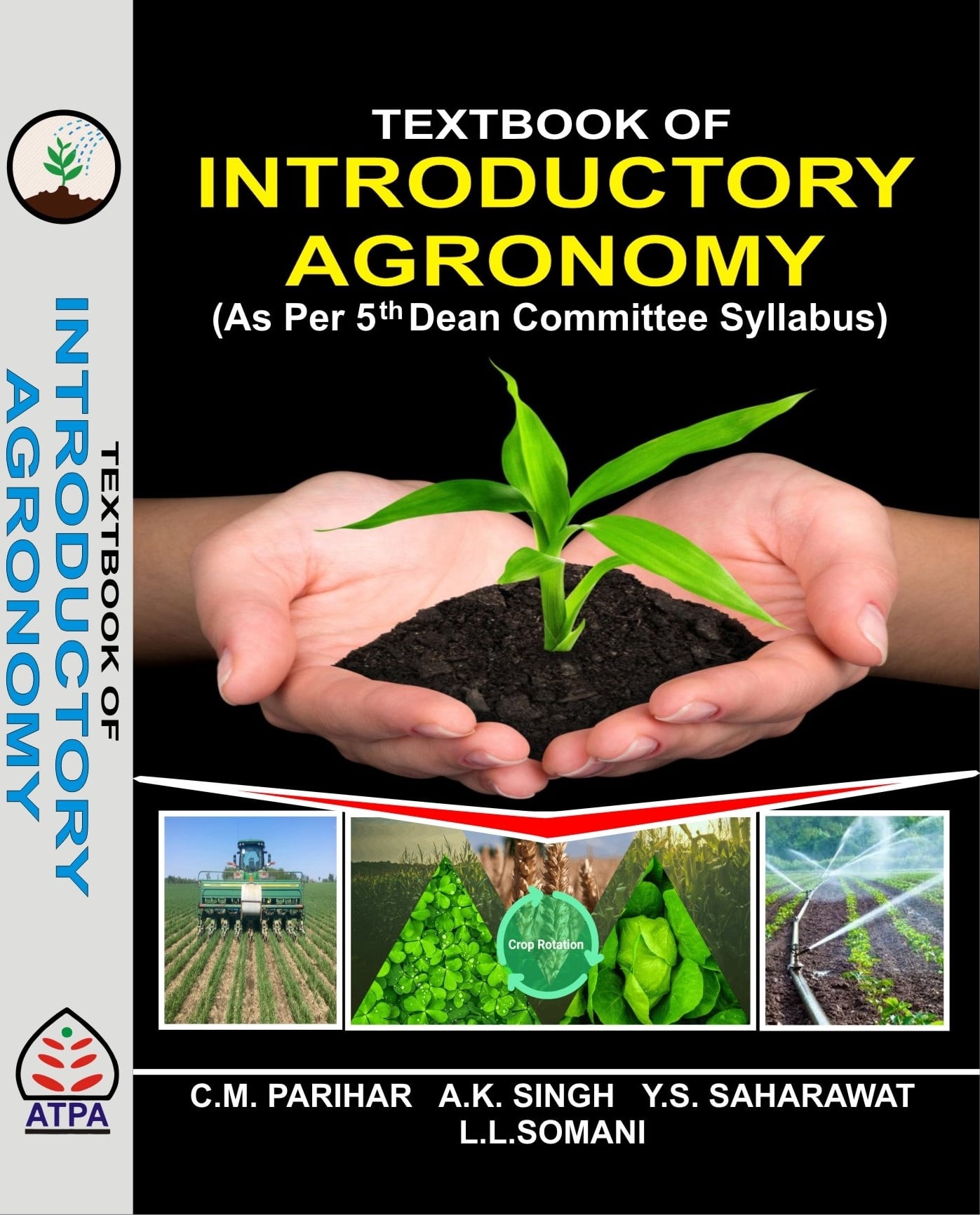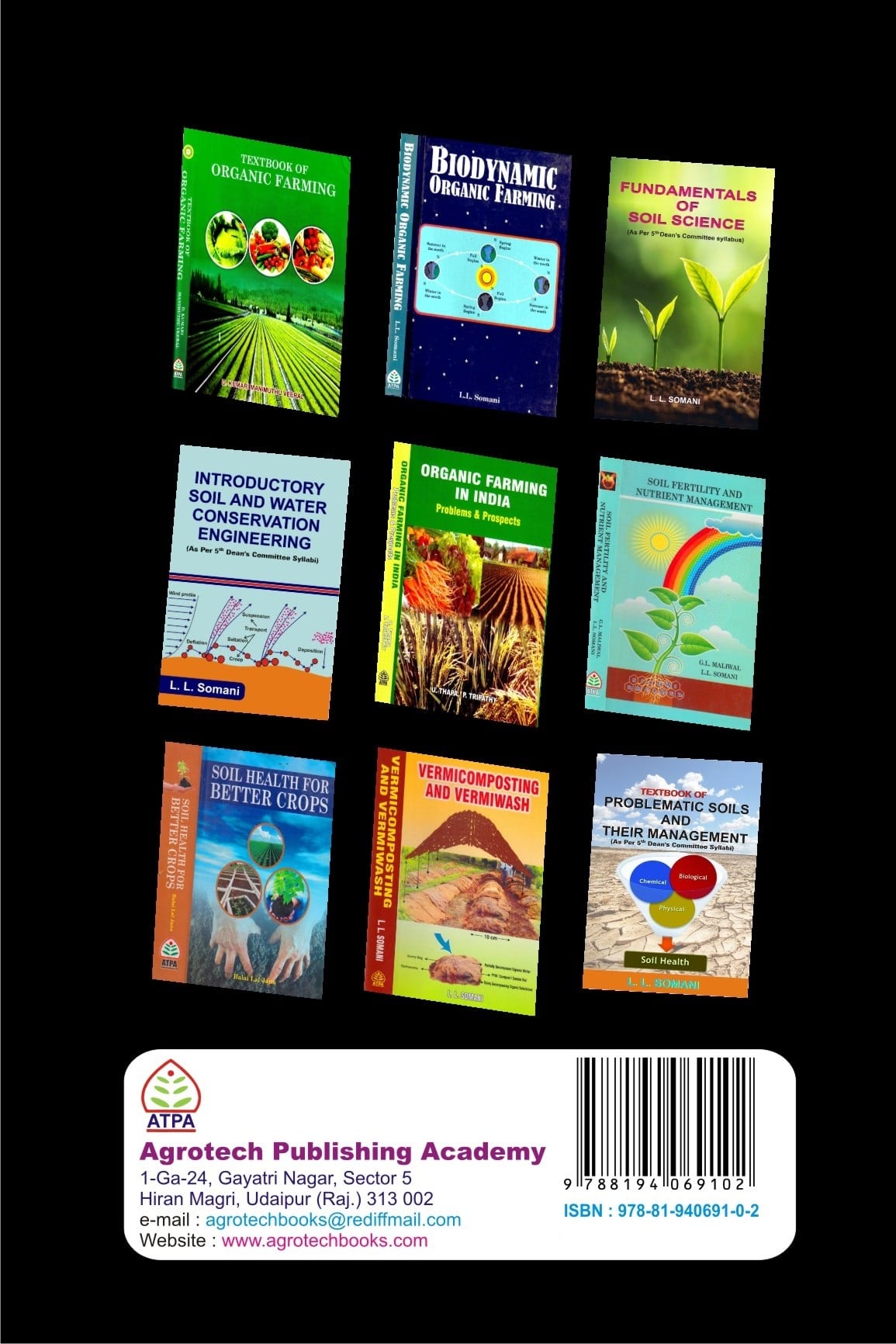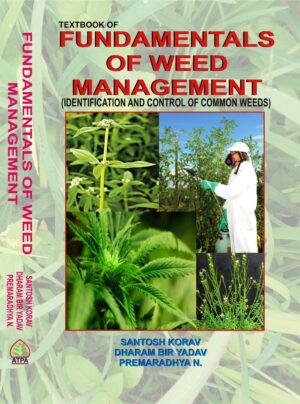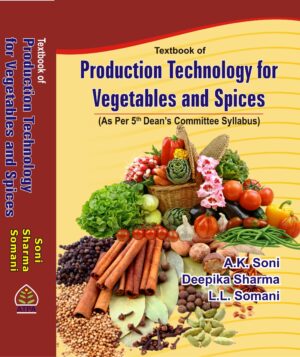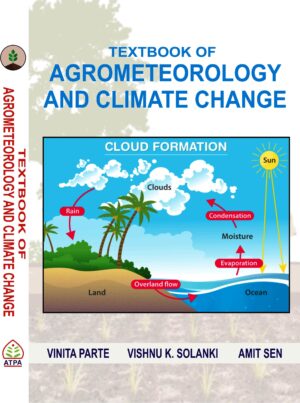TEXTBOOK OF INTRODUCTORY AGRONOMY
₹1,089.00
AUTHORS: C.M. PARIHAR, A.K. SINGH, Y.S. SAHARAWAT AND L.L. SOMANI
PUBLISHING YEAR: 2020
ISBN: 9788194069102
© All Rights Reserved
Description
ABOUT THE BOOK
Very often we ignore or miss the basic knowledge or information on which the multi-storeyed, multidisciplinary approach of crop production stands. It is strenuous strive to keep pace with the progress of such a vast subject like agronomy and horticulture which is in practice throughout the world. Efforts have been made in this textbook to collet and collate new concepts of agronomy and horticulture into a somewhat single unit understandable to the undergraduate students and useful as a remedial course to the workers and scientist of agriculture and allied disciplines.
There is a great need of a textbook for UG students of SAUs as related Introduction to Agronomy and Horticulture. For overall success of a student it is quite essential that she has gone through all the finer points of which an examiner is looking for. The authors have made an excellent attempt to compile this book taking due care of the syllabus recommended by the 5th Dean’s Committee of ICAR. The book is best suited for students preparing for competitive examinations such as JRF, SRF, NET, SLET, ASRB, IRMA, NABARD, Pre-PG, Ph.D. entrance exams, etc. The book Series: INTRODUCTION TO AGRONOMY AND HORTICULTURE is expected to serve as a ready material for all inquisitive minds to prepare for any traditional or internal grading system examinations, competitions and interviews, viva voce in the discipline of agriculture in general and agronomy in particular. We are sure that this book will be helpful to the students, scientist, teachers and aspirants looking for suitable jobs in the discipline of agronomy.
All our strains will be worthy if the text containing basic concepts and scope of agronomy, classification of crops, sowing and planting, crop growth and development, tilth and tillage, nutrient management, weed management, soil management, irrigation and water management, crop rotations and cropping systems, have been concisely dealt in separate chapters becomes helpful for whom this is made. The book will be very helpful for B.Sc. Agriculture and Horticulture students throughout the country as it covers nearly the entire syllabus for ‘Introduction to Agronomy ’ course framed by ICAR as suggested by 5th Dean’s Committee.
CONTENT
| S.No. | TITLE | Page No. |
| Preface | 3-4 | |
| Syllabus | 5 | |
| About the Book | 6 | |
| About the Authors | 8-10 | |
| CHAPTERS | ||
| 1. | Introduction and Scope of Agronomy | 11-20 |
| 2. | Classification of Crop plants
|
21-31 |
| 3. | Farming and Cropping systems | 32-68 |
| 4. | Principles of Tillage, Tilth and its Characteristics
|
69-98 |
| 5. | Soil Productivity, Fertility and Crop Nutrition
and Nutrient Classification |
99-123 |
| 6. | Nutrient Sources: Manures and Fertilizers | 124-174 |
| 7. | Integrated Nutrient Management
|
175-185 |
| 8. | Importance of Water in Plant Growth
|
186-189 |
| 9. | Soil Properties Influencing Moisture Availability | 190-193 |
| 10. | Irrigation | 194-225 |
| 11. | Drainage | 226-234 |
| 12. | Weeds: Definition and importance | 235-239 |
| 13. | Weeds: Dissemination and classification | 240-242 |
| 14. | Concept of weed management | 243-246 |
| 15. | Methods of Weed Control | 247-258 |
| 16. | Herbicides in weed control | 259-266 |
| 17. | Integrated Weed Management (I.W.M.) | 267-272 |
| 18. | Soil Management | 273-279 |
| LITERATURE CITED | 280 | |
ABOUT THE AUTHORS
Dr C. M. Parihar, is a Senior Scientist in Indian Council of Agricultural Research (ICAR), New Delhi. He obtained his Ph.D. degree in agronomy from ICAR-Indian Agricultural Research Institute (IARI), New Delhi, India. After obtaining his Ph.D., he devoted more than one decade for intensely working on basic and applied science in natural resource management and specifically on conservation agriculture (CA)-based sustainable intensification and teaching of IARI PG students. Dr. Parihar has conducted comprehensive research on soil health governing parameters under CA. His researches focused on the use of crop residue for C-sequestration and thermal sensitivity of sequestered-C at elevated temperature along with GHGs emission from soil which have been very useful in quantification of environmental footprints. These researches have provided scientifically sound basis and directions for enhancing the nutrient, water and energy use efficiency, economic profitability and soil health with reduced environmental footprints in maize-based cropping systems through adoption of CA. These research efforts have contributed to innovative ideas for development of “CA Roadmap for India”. Research results of his team/group of researchers have been well documented in over 65 peer reviewed high-impact journal articles, book chapters, book, manual, etc. Dr. Parihar has several awards and recognitions to his credit including Fertilizer Association of India (FAI)-Golden Jubilee Award-2019 for Excellence in Fertilizer Use Research, FAI-Golden Jubilee Award-2017 for Efficient Nutrient Management, ICAR-Indian Institute of Maize Research (IIMR)-Outstanding Researcher Award-2015, ICAR-IIMR-Young Scientist Award-2015, Indian Society of Agronomy (ISA)-PS Deshmukh Young Agronomist Award-2014, ICAR-Junior Research Fellowship (JRF), Gold Medal in M.Sc. (Agronomy), etc.
Dr A. K. Singh is Principal Scientist in ICAR-Indian Institute of Maize Research, Ludhiana since 2011. Prior to this he was Senior Scientist at Regional Centre, NBSS&LUP, Udaipur till January, 2009. Then he became Principal Scientist in Feb, 2009. He also served as Asst. Prof. in MPUAT, Udaipur from 1989 to 2000. He has devoted more than one decade for intensely working on basic and applied science in natural resource management and specifically on conservation agriculture (CA)-based sustainable intensification and teaching of IARI/MPUAT PG students. Dr. Singh has developed/ verified soil suitability criteria of major field crops and conducted comprehensive research on soil health governing parameters under CA. His researches focused on the use of crop residue for C-sequestration. These researches have provided scientifically sound basis and directions for enhancing the nutrient, water and energy use efficiency, economic profitability and soil health with reduced environmental footprints in maize-based cropping systems through adoption of CA. These research efforts have contributed to innovative ideas for development of “CA techniques for finding alternative to rice-wheat cropping system predominant in Indo-Gangatic plains”. Research results of his team/group of researchers have been well documented in over 75 peer reviewed high-impact journal articles, book chapters, book, manual, etc. Dr. Singh has several awards and recognitions to his credit including Fellow Indian Society of Agronomy, etc.
Dr. Yashpal S. Saharawat, is Principal Scientist and Country Director- India at International Fertilizer Development Centre (IFDC) since 2019. Prior to IFDC, he served as Principal Agronomist and Country Director at International Centre for Agricultural Research in Dry Areas (ICARDA) from 2014 to 2019. He has also worked as Senior Scientist at Indian Agricultural Research Institute (IARI), Pusa New Delhi, India from 2011 to 2014, Senior Associate Scientist at International Rice Research Institute (IRRI), Los Banos, Philippines from 2005 to 2011and International Fertilizer Development Centre (IFDC) Muscle Shoals, Alabama, USA in 2008. Dr. Yash received his PhD in Soil Science from Universitat Hohenheim, Stuttgart, Germany as a DAAD fellow and later completed MBA in finance from India. Dr. Yash is recipient of two Postdoctoral Fellow, one each from IRRI-Philippines and IFDC-USA.
His research interest span soil health, balanced and efficient fertilizer nutrition, natural resource management in changing climatic scenario and cropping system simulation modelling. Much of his work has been on basic, strategic and participatory research on conservation and precision agriculture (CPA). He developed long term innovation platforms across South Asia to wisecrack climate change mitigation and adaptation strategies, simulation studies on cropping systems of South Asia for food and nutrition security of smallholder farmers in South Asia. His research findings have been published in reputed international journals including more than 80 ISI journal papers and overall more than 200 research and extension material. He has been at the forefront of policy guidelines on CPA across South and Central Asia countries. His work has been appreciated through “India’s Pride”, award and “Associate Fellow of National Academy of Agricultural Sciences” awards. He has been working as Country Representative of Young Professionals for Agricultural Development (YPARD) from 2010 on voluntary basis to raise the voice of youth.
L.L. Somani is retired Director, Resident Instructions, MPUAT, Udaipur. He went To Waite Agricultural Research Institute, Adelaide, Australia for undertaking post-doctoral work (1975-77). He has over 400 research and technical articles to his credit. He has authored/edited over a 15 dozen of books.
Additional information
| AUTHOR/AUTHORS | A.K. SINGH, C.M. PARIHAR, L.L. Somani, Y.S. SAHARAWAT |
|---|---|
| PAGES | 280 |
| BINDING | Hard Back |
| PUBLICATION YEAR | 2020 |

